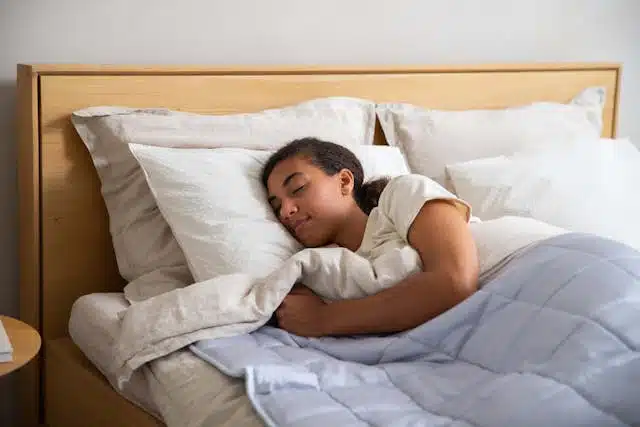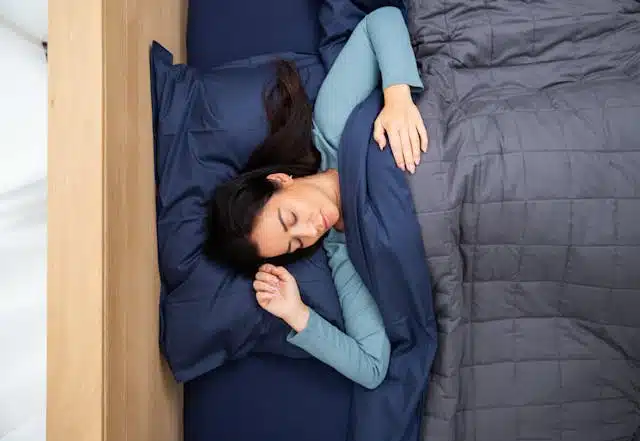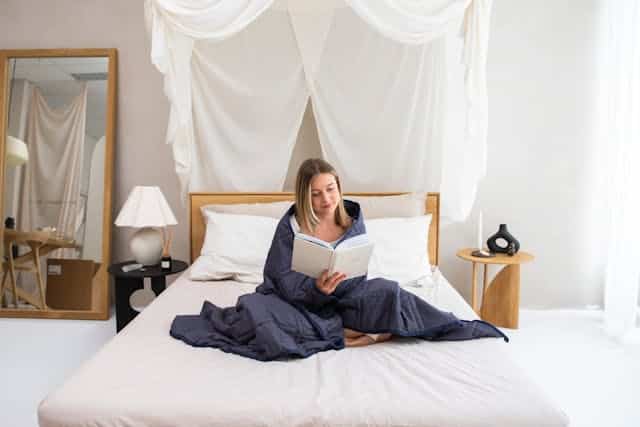How Using Weighted Blankets for Anxiety Can Actually Help
Using weighted blankets for anxiety has become increasingly popular in recent years as people search for natural remedies for stress relief and improved sleep quality.
Unlike traditional blankets, these therapeutic blankets are filled with materials such as glass beads or plastic pellets, providing gentle pressure across the body that mimics the calming effects of a hug.
Researchers suggest that this pressure may help regulate the autonomic nervous system, which plays a key role in anxiety symptoms like rapid heartbeat, shallow breathing, and restlessness.
While scientific evidence is still emerging, early studies and user reports highlight improvements in relaxation, reduced anxiety, and better sleep.
For individuals seeking supportive ways to manage mental health challenges, weighted blankets for anxiety may be a practical and soothing option.
Last update on 2026-02-02 / This article includes affiliate links/Images via Amazon Product Advertising API. I may earn commissions on purchases made through these links.
What Are Weighted Blankets?
Weighted blankets are specially designed blankets filled with materials such as glass beads, plastic pellets, or natural fillers that add extra weight compared to a standard blanket.
They typically range between 10 and 30 pounds, with most experts suggesting that the blanket should be close to 10% of your body weight for safe and effective use.
The added weight creates gentle, even pressure across the body, a sensation often compared to the calming effect of a hug or swaddle.
This pressure is known as deep pressure stimulation, which has been linked to reduced stress and improved sleep in both children and adults (Chen et al., 2016).
Originally, weighted blankets were primarily used in clinical and therapeutic settings, especially for children with autism spectrum disorder, sensory processing issues, or ADHD.
Over time, they have become more widely available and are now marketed as tools for managing anxiety, stress, and insomnia.
Today, they come in various sizes and materials, ranging from smaller lap blankets to full king-sized weighted blankets, allowing people to choose the option that best suits their needs and comfort preferences.
Why Are Weighted Blankets Good for Anxiety?

Weighted blankets are believed to work through a mechanism called deep pressure touch stimulation (DPTS), sometimes just referred to as deep pressure (Bontula et al., 2023).
This is the same soothing sensation you get from a firm hug, a massage, or being swaddled in a blanket.
Dr. Lynelle Schneeberg, a psychologist and fellow of the American Academy of Sleep Medicine, has explained that many people naturally find pressure against the body calming, which is why weighted blankets feel so relaxing.
This calming effect is thought to occur because deep pressure influences the autonomic nervous system (ANS), which is the part of the body that controls involuntary functions, such as heart rate and breathing.
Anxiety often shows up as physical symptoms such as a racing heartbeat, shallow breathing, or tightness in the chest.
These symptoms are linked to the sympathetic nervous system, also known as the “fight-or-flight” response.
On the other hand, the parasympathetic nervous system helps your body slow down and recover in its natural “rest-and-digest” mode.
By applying steady, gentle pressure, weighted blankets may help shift the balance away from the stress-driven sympathetic system and toward the calming parasympathetic system.
For many people, using a weighted blanket results in a greater sense of relaxation and reduced anxiety.
What Does Science Say About Weighted Blankets for Anxiety?

Although weighted blankets have become popular for easing stress and anxiety, the scientific evidence supporting their use is still relatively limited.
Most studies are small in scale and rely on self-reported outcomes, but the findings so far suggest some potential benefits worth noting.
For example, a 2016 study published in the Journal of the Formosan Medical Association found that weighted blankets influenced the autonomic nervous system in patients undergoing dental procedures.
Participants experienced shifts toward greater parasympathetic activity, which is linked to relaxation and reduced anxiety responses (Chen et al., 2016).
Another controlled study involving 60 healthy adults reported that using a weighted blanket improved heart rate variability, a marker of stress resilience and nervous system balance.
This suggested that the blankets may promote a calming effect by activating the body’s relaxation response (Gringras et al., 2014).
Additionally, research with psychiatric inpatients has shown that weighted blankets can reduce distress and anxiety when used in therapeutic sensory rooms.
Patients who used the blankets reported significantly greater improvements in calmness compared to those who did not (Becklund et al., 2020).
Overall, while larger and more rigorous studies are needed, these early findings indicate that weighted blankets may provide a safe and effective complementary approach for people dealing with anxiety.
Last update on 2026-02-02 / This article includes affiliate links/Images via Amazon Product Advertising API. I may earn commissions on purchases made through these links.
How to Use a Weighted Blanket for Anxiety
Using a weighted blanket is simple, but there are a few guidelines to make sure you get the most benefit and stay safe.
Most experts recommend choosing a blanket that weighs about 10% of your body weight, since too much weight can feel restrictive while too little may not provide the calming effect.
You can use a weighted blanket in several ways, including while sleeping through the night, while napping, or even while relaxing on the couch.
Many people find that pulling the blanket over their shoulders and torso provides the most soothing pressure, though you can adjust based on comfort.
If you struggle with anxiety at night, try adding the blanket to your bedtime routine to promote a sense of calm before sleep. For daytime stress, using it while reading, meditating, or resting can help activate the parasympathetic nervous system and encourage relaxation.
It’s also important to monitor how your body responds. If you notice discomfort, overheating, or trouble breathing, the blanket may be too heavy and should be replaced with a lighter option.
Is it Safe to Use a Weighted Blanket for Anxiety?
For most healthy adults, weighted blankets are considered safe and well-tolerated.
Research shows they generally do not affect vital functions such as heart rate, blood pressure, or oxygen levels, making them a low-risk option for managing stress and anxiety (Chen et al., 2016).
Many people even report improved sleep quality and reduced nighttime restlessness.
That said, safety depends on choosing the right weight and using the blanket properly.
A blanket that’s too heavy may feel restrictive, cause overheating, or interfere with breathing.
Experts typically recommend selecting a blanket that is approximately 10% of your body weight for the optimal balance of comfort and safety.
Weighted blankets are not recommended for young children, frail older adults, or anyone with conditions that affect breathing, circulation, or mobility, unless approved by a healthcare provider.
People with sleep apnea, chronic respiratory issues, or certain cardiovascular conditions should consult a doctor before use.
When chosen thoughtfully, weighted blankets can be a safe and soothing addition to an anxiety management routine.
Final Thoughts: Should You Use a Weighted Blanket for Anxiety and Stress Relief?

Weighted blankets are not a cure for anxiety, but they can be a helpful tool for calming the body and mind.
By providing deep pressure stimulation, they may reduce physical symptoms of stress, support the nervous system, and make it easier to relax or fall asleep.
Although more large-scale research is needed, early studies and user experiences suggest that weighted blankets are safe for most adults and can be a comforting addition to an anxiety management routine.
If you struggle with stress, restlessness, or difficulty sleeping, using a weighted blanket may be a worthwhile option, particularly as a natural remedy for stress relief.
Last update on 2026-02-02 / This article includes affiliate links/Images via Amazon Product Advertising API. I may earn commissions on purchases made through these links.
This website does not provide medical advice. This website site does contain affiliate links, and purchases may earn a commission.
Read my Medical Disclaimer, Review Disclaimer, and Publishing Policies for more details. Use of this site indicates acceptance of these terms.




